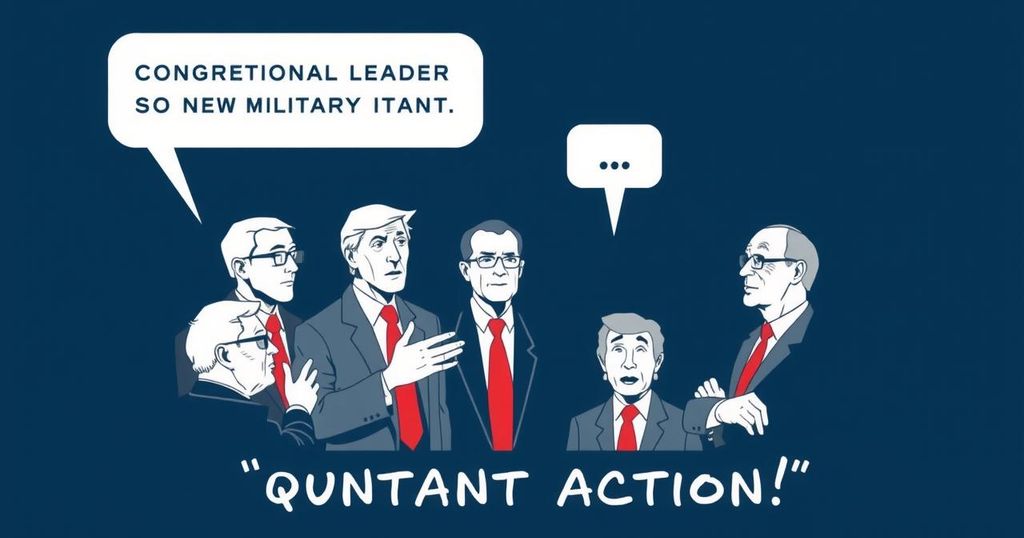Congressional Leaders React to Trump Ordering Strike Attack on Iran

Congressional leaders surprised by Trump’s unilateral order for airstrikes on Iran. Republican lawmakers generally supportive, while many Democrats question his authority. Sen. Graham praised the action, whereas Sen. Sanders condemned it as unconstitutional. House Speaker Johnson endorsed the strikes while some Republicans voiced concerns about legality. This continues to unfold as Congress responds to the president’s decision.
The political landscape grew increasingly tense Saturday night following President Donald Trump’s announcement of airstrikes targeting three Iranian nuclear sites. Congressional leaders responded swiftly, revealing a deep divide between party lines. While some Republican lawmakers applauded the decision, many Democrats raised concerns about its constitutionality and the president’s authority to act without congressional approval.
Senator Lindsey Graham, a South Carolina Republican known for his strong support of Israel, publicly supported Trump’s actions in a post on social media, labeling it a “right call” and expressing pride in the U.S. Air Force. “The regime deserves it. Well done, President @realDonaldTrump,” Graham stated. His remarks highlight the backing from a faction of the GOP who view assertive military actions as necessary against Iran.
In stark contrast, Senator Bernie Sanders voiced his fierce opposition during a campaign event in Tulsa, Oklahoma. He read aloud Trump’s declaration, which drew immediate boos from the crowd. “This is alarming — all of you have just heard. But it is so grossly unconstitutional. Only Congress has the authority to take this country to war,” Sanders argued, emphasizing the legislative branch’s critical role in matters of war.
Representative Rick Crawford from Arizona, chair of the House Intelligence Committee, noted he was in contact with Trump prior to the airstrikes, asserting his ongoing monitoring of the situation. He expressed regret about Iran’s trajectory, yet seemed to acknowledge the weight of Trump’s actions. “I am thankful President Trump understood that the red line articulated by both parties was real,” he commented.
Conversely, Representative Tom Massie of Kentucky expressed skepticism regarding the legality of the military strike, stating, “This is not constitutional.” His reaction underlines a pushback from some Republicans against the president’s unilateral decision. Likewise, Representative Jim Himes, a Democratic voice in the House Intelligence Committee, highlighted the need for Congressional oversight. “According to the Constitution we are both sworn to defend, my attention to this matter comes BEFORE bombs fall. Full stop,” he tweeted.
Democratic Representative Ro Khanna of California echoed Himes’ sentiments, stressing the urgent need for Congress to vote on a War Powers Resolution to prevent further military entanglement in the Middle East. He asserted, “We need to immediately return to DC and vote on this matter.”
House Speaker Mike Johnson was briefed on Trump’s decision prior to the strikes but had to cancel a planned trip to Israel due to the unfolding crisis. Johnson called the strikes a “decisive” action against terrorism. Senate Majority Leader John Thune also received early briefings about the military actions.
Republicans like Senator John Barrasso praised the strikes, asserting, “President @realDonaldTrump’s decision to strike Iran’s nuclear program is the right one.” Senator John Cornyn from Texas echoed this sentiment, calling it a “courageous and correct decision” and recognizing the U.S. military’s role. Meanwhile, Democratic Senator John Fetterman also voiced support for the strikes, highlighting Iran’s position as a top sponsor of terrorism and endorsing the need for U.S. military strength.
As reactions continue to pour in, the situation remains fluid, and further developments are expected as Congress contemplates its next steps amidst this military action.
The divided reactions from Congress regarding Trump’s order for airstrikes on Iran’s nuclear facilities reveal a significant partisan split, with Republicans largely supportive and Democrats raising constitutional concerns. As lawmakers navigate this controversial action, the implications for U.S. foreign policy and military involvement in the region remain critical. The ongoing dialogue highlights the necessity for congressional oversight in matters of significant national security and military engagement. Further updates will be necessary as the story unfolds.
Original Source: abcnews.go.com







